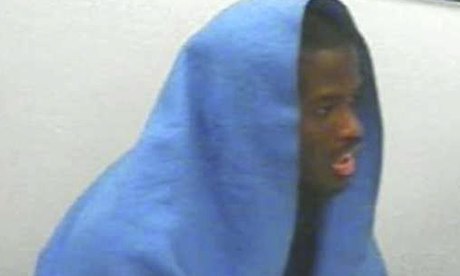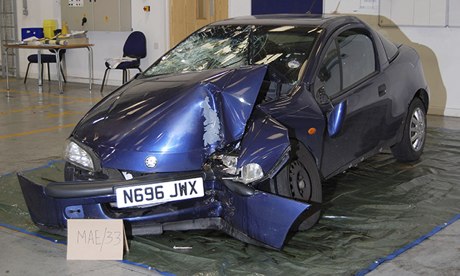
Michael Adebolajo in a police interview recording, shown during the trial in which he stands accused of the murder of Lee Rigby. Photograph: Metropolitan Police/PA
A man who denies murdering Lee Rigby told police in video-recorded interviews that the soldier's neck "was sawed … until almost detached" and that he hoped Allah would forgive him "if I acted in a way that is displeasing to him", a jury heard on Wednesday.
Michael Adebolajo told detectives during questioning about Rigby's death outside the Woolwich military barracks: "It brings me little joy to approach anybody and slay them."
Adebolajo and the co-defendant in the trial, Michael Adebowale, deny murder.
The jury at the Old Bailey watched a video of Adebolajo being interviewed by police after his arrest on suspicion of the murder.
Adebolajo was interviewed 10 days after Rigby was run over by a car, then set upon by two men who attempted to behead him as they inflicted stab wounds to his neck and torso that were up to 14cm deep.
The two accused were shot by police at the scene, on 22 May, after allegedly charging a police car while bearing weapons.
Both men were treated in hospital before being declared fit to be interviewed.
The jury today watched the video recording of Adebolajo's interview conducted on 1 June at Southwark police station.
 The Vauxhall Tigra that hit Lee Rigby before he was killed. Photograph: Metropolitan police/PA
The Vauxhall Tigra that hit Lee Rigby before he was killed. Photograph: Metropolitan police/PA
A detective said: "Tell me what happened to Lee Rigby." Adebolajo replied: "Lee Rigby was killed on 22 May. He was struck in the neck with a sharp implement and it was sawed until his head, you know, became almost detached. May Allah forgive me if I acted in a way that is displeasing to him."
In the video recording, Adebolajo wore a light blue cell blanket over his head because he felt cold.
He was asked about the claim from an officer who alleged he earlier had said he was not denying the murder. Adebolajo denied that and alleged he had in fact said: "More likely, and to my memory … I'm not denying anything."
Sitting across a table from two counter-terrorism detectives, Adebolajo was asked about the attack.
The jury heard that a senior psychiatrist who examined Adebolajo before his interview with detectives found him sane and showing no signs of mental illness.
Adebolajo called one detective by his first name and apologised for forgetting the name of his colleague, who was an Asian detective serving in Scotland Yard's counter-terrorism command.
As the interview went on Adebolajo's voice at times became louder as he became more emotional as he detailed the west's alleged oppression of Muslims.
Adebolajo questioned the sincerity of the detectives, at one point speaking for over 20 minutes with a Qur'an on the table in front of him.
He said he wanted people through his interview to "understand the nature of the war that is ongoing and has been ongoing for many years now between the Muslims and the British people".
He attacked politicians, past and present: "I am particularly disgusted by the likes of David Cameron, the Miliband brothers and – what's his name? – Nick Clegg."
He claimed Cameron was trying to emulate the politician Adebolajo condemned most during the interview, Tony Blair, who took Britain into wars in Afghanistan and then Iraq.
Adebolajo told detectives that Blair "began the trend of using the magic of the tongue to dodge very important questions".
Adebolajo told the two detectives he believed that British people were at war with Muslims because of the actions of this country's leaders, the jury heard.
"These lands where your leaders are sending your working-class men are lands where the men love death more than they love life," he said.
At one stage, the suspect attempted to compare the British military presence in Afghanistan with the possibility of French troops on the streets of London.
"If France was to decide 'we want that piece of land that is only one-hour journey away by train' I do not believe the British people for one moment would accept French troops marching on the streets of London telling men where they may or may not walk," he said. "Do you know why? Because I grew up here. I know the British people. I am a British person."
The jury heard Adebolajo complain that Britain was governed by people who led in "a very wicked, corrupt and oppressive manner".
He later told police he was "not a man who gains joy from horror movies" or "seeing blood spurt over the camera lens", the court heard.
As the interviews continued, Adebolajo became increasingly frustrated with the two counter-terror detectives sitting opposite him. He accused them of being jobsworths who were only interested in going to bed at night knowing they had satisfied their supervisors.
Adebolajo said he would only answer questions if the detectives confirmed they were being asked "purely to help the family of Lee Rigby and the British people".
Adebolajo then removed the blanket from his head, stood up from the police table and ended the interview, telling the pair: "I have not patience for men like this … I'm finished with this guy."
Before the interview started Adebolajo was reminded he was under criminal caution. He was also told the interview was being recorded.
During the interview Adebolajo praised the fact that he was entitled to free legal advice.
The detective could be heard speaking in a matter-of-fact voice, and set out what subjects he wanted the interview to cover.
His head started to peek out from under the light blue blanket as he talked to detectives.
In separate evidence heard by the court, Simon Poole, a Home Office pathologist who carried out a postmortem on Rigby, described the injuries to the soldier's neck as "numerous and very deep".
The prosecutor, Richard Whittam QC, told the court that a second pathologist, who carried out a further examination of Rigby's body, counted a minimum of 14 separate injuries to the 25-year-old's head and neck area "the worst of sufficient force to cause damage to bone or cartilage".
The case continues.

Sign up for the Guardian Today
Our editors' picks for the day's top news and commentary delivered to your inbox each morning.
Sign up for the daily email
No comments:
Post a Comment